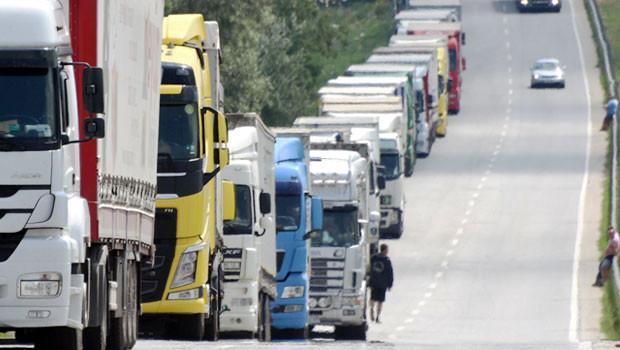Turkish truck drivers could face more protectionism: Official
ANKARA/BERLIN- Anadolu Agency

The challenges faced by Turkey in international road transportation are actually against the World Trade Organization's determination on freedom of transit, according to the secretary general of the Geneva-based International Road Transport Union (IRU).
"Trade is supposed to flow freely, and we should remove all barriers to it, especially at the borders," said Umberto De Pretto.
Turkish truck drivers are finding it difficult to obtain visas quickly and easily, and the reason for this obstacle is that some countries claim there are security concerns in allowing Turkish drivers rapid passage, but this is entirely false.
De Pretto insists that this is actually the result of protectionism.
"Keeping our trucks out means blocking our economy. Yet it still happens today. Holding the drivers hostage when they should be moving in their trucks is contrary to sustainable development," he said.
"So the IRU is pushing the UN and the WTO to take concrete steps in resolving this transit permit issue," said De Pretto, adding the free movement of trucks is vital to the free movement of goods.
De Pretto noted a long history for this challenge.
"I think the political mood has to change. It is basic economics that free trade is the best solution for any issue, but today, the WTO determination of freedom of transit is not practiced for political reasons. I'm afraid to say that we will see more protectionism," he said.
Turkey and the European Union have been in a Customs Union since 1995.
Freedom of movement is a cornerstone of that agreement, but there are more than
21,000 Turkish trucks on EU roads for whom the deal is not being respected, he said.
Turkey conducts nearly half of its total foreign trade with the EU. Road transport is the largest means of goods transport at 75%.
But the ability of businesspeople from Turkey to undertake commercial activities in the EU is hindered by restrictive visa policies. Turkish logistics companies face the same challenge of acquiring the necessary visas before entering and crossing the EU.
Turkish-registered goods vehicles that enter the EU each year at the Hungarian, Austrian and Bulgarian borders face administrative hurdles.
They must submit a range of documents to the relevant authorities, from product invoices and export declarations to insurance certificates and transport permits for each member state through which they transit. This means that truck queues can be up to 17 kilometers (around 11 miles) long at the Bulgarian–Turkish border and crossing can take up to 30 hours.
In many cases, there are also quota limits on the number of transport permits that may be issued to Turkish trucks and lorries by an EU member state, with demand exceeding the number of permits available.
It is estimated that liberalization of transportation could add €3.5 billion in bilateral trade volumes.
















